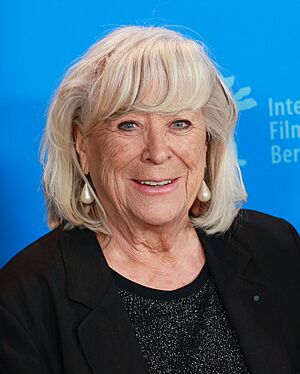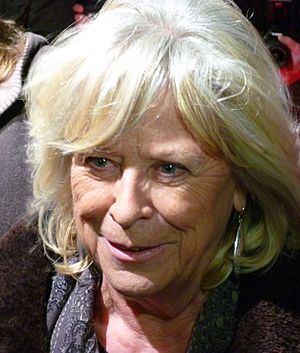Margarethe von Trotta facts for kids
Quick facts for kids
Margarethe von Trotta
|
|
|---|---|

Margarethe von Trotta at the 2023 Berlinale
|
|
| Born | February 21, 1942 Berlin, Germany
|
| Occupation |
|
| Years active | 1968–present |
| Movement | New German Cinema (1971–1991) |
| Children | Felix Moeller |
Margarethe von Trotta (born February 21, 1942) is a famous German film director, screenwriter, and actress. She is known as a leading figure in the New German Cinema movement, a time when German filmmakers created new and artistic movies. Von Trotta has won many international awards for her work.
For a time, she was married to director Volker Schlöndorff, and they worked on films together. However, von Trotta wanted to create her own movies. She went on to become one of Germany's most important female film directors. Her work is sometimes compared to the films of the famous Swedish director Ingmar Bergman.
Von Trotta is often called a leading feminist filmmaker. Her movies aim to show women in new ways. They often explore relationships between women, like sisters or best friends, as well as relationships between men and women. Many of her films also have political themes.
Contents
Early Life and First Steps in Film
Margarethe von Trotta was born in Berlin, Germany. Her mother was Elisabeth von Trotta, and her father was the painter Alfred Roloff. After World War II, she and her mother moved to the city of Düsseldorf. Growing up without her father, she formed a very strong bond with her mother. This relationship helped her understand friendship and support between women, which became a major theme in her films.
In the 1960s, von Trotta moved to Paris. There, she fell in love with movies by directors like Ingmar Bergman and Alfred Hitchcock. She said, "all of the sudden I understood what cinema could be... that is what I'd like to do with my life." At that time, it was rare for women to be directors. So, she started her career as an actress in films by famous German directors like Rainer Werner Fassbinder and Volker Schlöndorff.
Becoming a Director
After acting for several years, von Trotta began to help write and direct films. Her first major project was co-directing The Lost Honour of Katharina Blum (1975) with Schlöndorff. The film was a huge success in Germany. On set, von Trotta was in charge of working with the actors, while Schlöndorff handled the technical side of filmmaking.
Her first movie as a solo director was The Second Awakening of Christa Klages in 1978. This film explored themes that would appear in many of her later works, such as female friendship and the effects of political actions.
Famous Films by von Trotta
The Sister Films
Von Trotta is well-known for a group of three films that explore the lives of sisters. These are often called her "sister films."
- Sisters, or the Balance of Happiness (1979) tells the story of two sisters, Maria and Anna. The film explores their close but difficult relationship.
- Marianne and Juliane (1981), also known as The German Sisters, is about two sisters who grow apart because of their different political beliefs. When one sister dies unexpectedly, the other becomes determined to find out the truth about what happened. The film uses flashbacks to show memories from their childhood and adult lives. This movie won the Golden Lion, the top prize at the Venice Film Festival.
- Love and Fear (1988) is about three sisters named Olga, Masha, and Irina. The film looks at their search for love and meaning in their lives. It focuses more on personal feelings than politics.
Films About Historical Women
Von Trotta has directed several films about real and important women from history. She is interested in strong women who had to fight for their beliefs.
- Rosa Luxemburg (1986) is a film about the famous socialist leader Rosa Luxemburg. The movie shows both her public life as a revolutionary and her private life. The actress who played Rosa, Barbara Sukowa, won the Best Actress award at the Cannes Film Festival for her performance.
- Vision (2009) tells the true story of Hildegard of Bingen, a brilliant nun from the Middle Ages. Hildegard was a writer, composer, and thinker who challenged the church's rules to create a better community for her fellow nuns.
- Hannah Arendt (2012) focuses on a key period in the life of the German-Jewish philosopher Hannah Arendt. Von Trotta has said she is drawn to women like Arendt who want to understand the world around them.
Other Important Films
- Rosenstrasse (2003) is a powerful film about a group of non-Jewish women in Berlin who protested to save their Jewish husbands during World War II. The story is told through the eyes of a woman looking back on her mother's past.
Personal Life
In 1964, von Trotta married Jürgen Moeller, and they had a son, Felix Moeller, who is also a documentary director. After they divorced, she married filmmaker Volker Schlöndorff in 1971. They raised Felix together and collaborated on several films before separating in 1991.
Filmography
Feature films
| Year | Title | Role | Notes |
|---|---|---|---|
| 1975 | The Lost Honour of Katharina Blum (Die verlorene Ehre der Katharina Blum) | ||
| 1978 | The Second Awakening of Christa Klages (Das zweite Erwachen der Christa Klages) | ||
| 1979 | Sisters, or the Balance of Happiness (Schwestern oder die Balance des Glücks) | Screenplay, Director | |
| 1981 | Marianne and Juliane (Die bleierne Zeit) | Also known by the English title of The German Sisters | |
| 1983 | Sheer Madness (Heller Wahn) | ||
| 1986 | Rosa Luxemburg | Director | |
| Anthology film. Segment "Eva" | |||
| 1988 | Love and Fear (Fürchten und Lieben / Paura e amore) | Also known as Three Sisters or Trois Soeurs in French | |
| 1990 | The African Woman (Die Rückkehr / L'africana) | ||
| 1993 | The Long Silence (Zeit des Zorns / Il lungo silenzio) | ||
| 1995 | The Promise (Das Versprechen) | Director | |
| 2003 | Rosenstrasse | Director | |
| 2006 | I Am the Other Woman (Ich bin die Andere) | ||
| 2009 | Vision (Vision – Aus dem Leben der Hildegard von Bingen) | ||
| 2012 | Hannah Arendt | Writer, director | |
| 2015 | The Misplaced World (Die abhandene Welt) | ||
| 2017 | Forget About Nick | Director | |
| 2018 | Searching for Ingmar Bergman | Writer, director | Documentary |
| 2023 | Ingeborg Bachmann – Journey into the Desert | Writer, director |
Television films and series
| Year | Title | Notes |
|---|---|---|
| 2012 | Mai per amore: La fuga di Teresa | TV series episode |
| 2010 | Die Schwester | TV film |
| 2007 | Tatort: Unter uns | TV series episode |
| 2004 | Die andere Frau (The Other Woman ) | TV film |
| 2000 | Anniversaries | |
| 1999 | Days of Darkness | TV miniseries |
| 1998 | At Fifty Men Kiss Differently | TV film |
| 1997 | Winterkind | TV film |
Actress
| Year | Title | Role | Notes |
|---|---|---|---|
| 1984 | Bluebeard (TV film) | Jutta | |
| 1977 | Bierkampf | ||
| 1976 | Coup de Grâce | Sophie von Reval | |
| 1976 | Das Andechser Gefühl | Movie star | |
| 1976 | Die Atlantikschwimmer | Swimming instructor | |
| 1974 | Stayover in Tyrol (TV film) | Katja | |
| 1973 | Desaster (TV film) | Ulla Werther | |
| 1972 | A Free Woman | Elisabeth Junker | Also, Screenplay |
| 1972 | The Morals of Ruth Halbfass | Doris Vogelsang | |
| 1971 | Warnung vor einer heiligen Nutte | Babs | |
| 1971 | The Sudden Wealth of the Poor People of Kombach | Sophie | |
| 1970 | The American Soldier | Chambermaid | |
| 1970 | Gods of the Plague | Margarethe | |
| 1970 | Baal (TV film) | Sophie | |
| 1969 | The Arsonists (TV film) | Anka | |
| 1969 | If You Play with Crazy Birds | Helga | |
| 1967 | Tränen trocknet der Wind… | Gaby |
Awards and nominations
| Year | Award | Category | Work | Result | Notes |
|---|---|---|---|---|---|
| 2022 | European Film Awards | Lifetime Achievement Award | Won | ||
| 2019 | German Film Awards | Honorary Lifetime Award | Won | ||
| 2013 | Germany's Art House Cinema Owners Association AG Kino | Gilde Film Prize | Hannah Arendt | Won | |
| 2012 | Leo Baeck Medal | Won | |||
| 2004 | Taormina International Film Festival | Taormina Arte Award | Won | ||
| Hessian Film Awards | Honorary Award | Won | |||
| David di Donatello Awards | Best European Film | Rosenstrasse (2003) | Won | ||
| Golden Globes, Italy | Best European Film | Won | |||
| 2003 | Venice Film Festival | Golden Lion | Nominated | ||
| SIGNIS Award | Honorable Mention | ||||
| 2001 | Biarritz International Festival of Audiovisual Programming | TV series and Serials | Anniversaries (2000) | Special Mention | |
| 2000 | Golden Camera, Germany | Audience Camera Award | Days of Darkness (1999, TV) | Won | |
| 1995 | Guild of German Art House Cinemas | Guild Film Award-Gold | The Promise (1995) | Won | |
| Bavarian Film Awards | Best Direction | Won | |||
| 1994 | Flaiano International Prizes in Cinema | Career Award | Won | ||
| 1993 | Montreal World Film Festival | Most Popular Film and Prize of the Ecumenical Jury | Il Lungo Silenzio (1993) | Won | |
| 1989 | German Film Awards | Special Film Award '40th Anniversary of the Federal Republic of Germany' | Marianne and Juliane (1981) | Won | |
| 1988 | Cannes Film Festival | Palme d'Or | Love and Fear (1988) | Nominated | |
| 1987 | Guild of German Art House Cinemas | Guild Film Award - Gold | Rosa Luxemburg (1986) | Won | |
| 1986 | Cannes Film Festival | Palme d'Or | Nominated | ||
| 1983 | Berlin International Film Festival | Golden Bear | Sheer Madness (1983) | Nominated | |
| OCIC Award | Honorable Mention | ||||
| 1982 | David di Donatello Awards | Best Foreign Film | Marianne and Juliane (1981) | Nominated | |
| Best Foreign Director | Won | ||||
| Best Screenplay | Nominated | ||||
| 1981 | Venice Film Festival | Golden Lion | Won | ||
| Valladolid International Film Festival | Honorable Mention | ||||
| Créteil International Women's Film Festival | Grand Prix Award | Sisters, or The Balance of Happiness (1979) | Won | ||
| Gold Hugo | Chicago International Film Festival | The German Sisters (Die bleierne Zeit) | Won | ||
| 1972 | German Critics Association
Awards in Film |
Critics Award | Won |
See also
 In Spanish: Margarethe von Trotta para niños
In Spanish: Margarethe von Trotta para niños
 | Madam C. J. Walker |
 | Janet Emerson Bashen |
 | Annie Turnbo Malone |
 | Maggie L. Walker |


